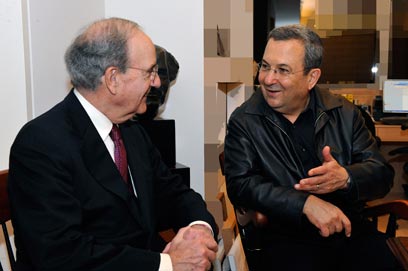
Mitchell in Middle East to revive peace talks
Following 'excellent meeting' with Defense Minister Barak, US special envoy to meet Sunday with Prime Minister Netanyahu. Palestinian side preparing for start of indirect dialogue as well. US Vice President Biden expected to arrive in region on Monday
Mitchell landed in Israel on Saturday evening, following Netanyahu's statement last week that "the conditions for restarting the negotiations have matured."
Upon landing, Mitchell met with Ehud Barak at the defense minister's Tel Aviv home. The meeting, which was defined by Barak as "excellent", lasted an hour and a half. The two discussed the conditions for the US-brokered indirect talks with the Palestinians.
The Arab League last week green lighted the talks, but limited them for four months. In this move, Arab countries – excluding Syria – are providing an "umbrella" pushing Palestinian President Mahmoud Abbas to hold indirect negotiations with Israel.
The policy guiding the moderate Arab states, led by Egypt, as well as the international community, is that failing to revive the peace process would encourage Iran and its satellite organizations – Hamas and Hezbollah – and result in another escalation in the region.

Mitchell with Barak. 'Excellent meeting'
The Palestinian Authority is preparing for Mitchell's visit as well. Mohammed Dahlan, the spokesman for Fatah's Central Committee, said at the end of the committee's meeting over the weekend that his movement would present the Palestinian organizations with the main principles of the Arab recommendation.
Dahlan has expressed his doubts in the past few days over the chances that the negotiations would lead to a political breakthrough, saying that Israel's government does want peace.
A Palestinian source told Ynet that Mitchell would engage in laying the foundations for the indirect talks. He added that the American envoy would also try to push to a discussion of the daily life of the Palestinian population in the West Bank.
Mitchell is expected to meet with Prime Minister Netanyahu on Sunday afternoon, ahead of US Vice President Joe Biden's arrival on Monday. The Prime Minister's Office denied reports that the Palestinians had received guarantees from the Americans that Israel would be pressured should the negotiations fail.
The American vice president's visit to Jerusalem may be used for an official declaration on the start of the indirect talks between the parties. The Israeli political echelon, headed by Netanyahu, hopes that these talks will be followed by direct negotiations.
Mitchell is expected to shuttle between Jerusalem and Ramallah. The first step will be to determine the formality of the talks, and it will be followed by a preliminary discussion on the core issues.
Biden to discuss Iran as well
The Palestinian issue is the most urgent one during Mitchell and Biden's visit, but the most important issue on the agenda is the Iranian nuclear threat, which will be one of the main issues the US vice president will be discussing with the prime minister and other Israeli officials.
Biden is also expected to signal that Jerusalem must not make decisions on any military moves against the Iranian threats before the sanction moves planned by the White House are utilized to the fullest.
Deputy Foreign Minister Daniel Ayalon is expected to travel to Washington next week for discussions with senior American officials, during which Israel is expected to push for a move of "crippling sanctions" against the Islamic Republic. This was defined by Foreign Minister Avigdor Lieberman last week as "the Cuban model" – a similar move to the one led by the United States against Cuba in the early 1960s on the backdrop of the missile crisis during the Cold War.
Jerusalem fears that the sanctions – which have been delayed from early February to late March, and perhaps even to late April – will not be firm enough. Prime Minister Netanyahu believes the transfer of fuel and oil distillates to Iran must be limited.
Ali Waked contributed to this report










